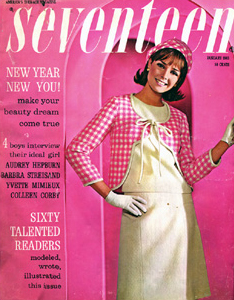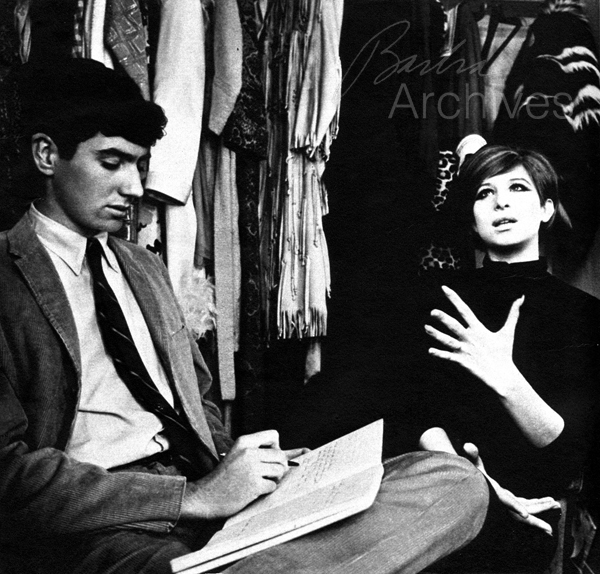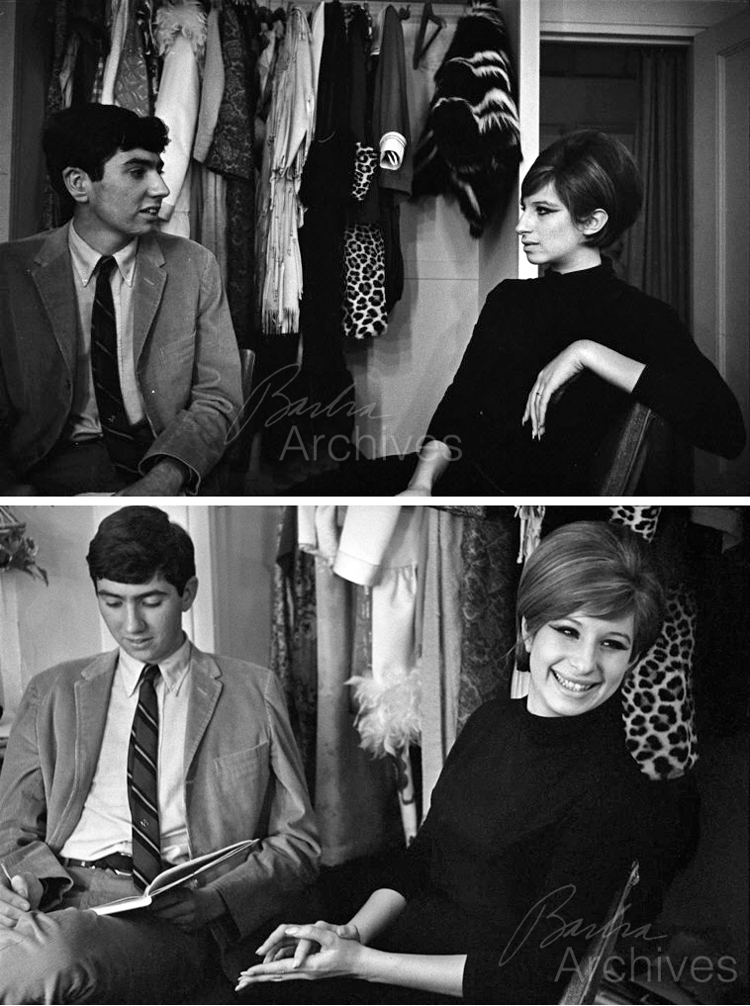
Seventeen
January 1965
Follow A Star: Four Teen Reporters Find Out What Their Dream Girls Are Really Like
Photos by Eve Arnold
BARBRA STREISAND fills the stage of the Winter Garden theater. I went to see Funny Girl on the day I was to interview her, and though I had seen the show before, the magic was still there. I just couldn't take my eyes off her. Acting, dancing or singing, she is a genius. She uses every part of her body to advantage, getting laughs with a crossed eye, a pigeon-toed walk or a knock-kneed stance, and she sings each song with the same feeling and fervor she did on opening night. Still under the spell of her performance, I was surprised to find that in person she is down-to-earth, perceptive and very interested in things and people around her. She came into her dressing room wearing a black and white monkey fur jacket, a black sweater, black stretch pants and high black leather boots. Her hair was smooth and backswept and her eyes were made up; she looked like half the girls in New York City. Or rather, half the girls in New York City now look like her.

We were introduced, Barbra smiled hello, apologized for being late and began to fire questions at me. Where did I go to school? How did I happen to be interviewing her? She seemed really curious about me, and I had to interrupt to get the conversation back to her. Funny Girl is based on the life of Fanny Brice, and though I knew Barbra hadn't read about Miss Brice or listened to her records, many people have commented on the uncanny resemblance between the two stars. Barbra said she hadn't studied Fanny Brice because she didn't want to imitate anybody. “And I wouldn't want to invite people to make comparisons, either. Fanny Brice was Fanny Brice. I'm me. The songs are my songs. The affinity, the parallels in our lives and beliefs are there naturally, so I can comprehend the essence of her character, her spirit.”
Because Barbra is so recently out of her own teen-age years, I was interested in her feelings about my generation. “I hate collective questions like that,” she said. “If a person is nice, I like him. It doesn't matter, if he's fifteen or thirty. Teen-agers are people. I love weird kids though. Don't be afraid to be weird, but don't wear strange clothes unless you really have to,” she laughed. “I did because I felt that I was different. I don't know if I really wanted to be sweet and pretty—I guess all girls do at that age—but I dressed that way because I wasn't. I wore funny clothes to say 'take me the way I am; I don't care what you think anyway.' ” Now, of course, it's hard for Barbra to be "different"—so many women are trying to imitate her style. “I'm flattered that women copy my hair and wear middy blouses and things like that. But I'm going to cut my hair—I mean really cut it.”
“Like a fifth Beatle?” I asked.
“No, shorter. I wonder what they'll do then,” she said with a twinkle.
As a teen-ager, Barbra was a "loner" who kept most of her thoughts to herself. “People should never ask other people for advice. You must feel things yourself and know innately what to do. If it's not your own thought, it can't solve your problem. You can't ask someone how to become a star.” Barbra always sensed that she would be a star; when I asked if all her dreams about stardom had come true, she smiled. “Reality can never live up to a dream. I can't remember what I expected in specific terms, except of course that I never thought of any of the bad things that come with success. C'est la vie.”
Asked about her unique singing style, Barbra said, “I wasn't consciously influenced by anyone. I had no idols. Subconsciously, of course, I guess I did, but mostly I was aware of things I heard and saw that I didn't like. They taught me a lot. You can learn the right from the wrong.” Her choice of songs is as unusual as her style; most of them are old, but there was no special search for old songs—“I just sing the ones I like. A friend of mine had a great collection of old records and tapes and I used to listen to them. I never knew what was popular at the time anyway.”
There's a line in Funny Girl which Barbra speaks in mock complaint: “Where is all the suffering an actress is supposed to go through before she makes it? I haven't suffered enough yet.” Luckily for Barbra, the line runs true to life. “If it hadn't happened quickly for me, I wouldn't be here,” she said. “I was fortunate not to have to work in cheap nightclubs or in the chorus. I could never be in the chorus. I admire people who can, but it's not right for my temperament. I give up too quickly. I'm impatient. Even when I made the rounds for a while, I never begged for work. I couldn't sell my soul for a job. If they said they'd call me, I said 'okay' and left. I didn't say, 'Please, please call' or try to convince them how great I was—just 'good-by.'”
Barbra is married to a fellow actor, Elliot Gould, whom she met when both were in I Can Get It for You Wholesale. I asked if her career had affected her marriage and she laughed. “Everything affects your marriage. You have to give up certain things, make compromises if you both have careers. But some husbands don't like their wives to work in an office either. When two people are mature, it doesn't matter what their professions are.”
Barbra's hairdresser appeared at the door, and I knew that she had to prepare for her evening performance. I thanked her for her time and left the theater thinking about this new person in my life— no longer a performer separated from me by a stage, a vinyl disk or a picture tube, but a warm, talented, complicated person. Of one thing I was immediately certain— success has definitely not spoiled Barbra Streisand.
CURTICE TAYLOR enjoys sailing, dancing (the Charleston, the Frug, the Monkey) and “any movie directed by John Huston or Ingmar Bergman.” He'd like to study drama in college, eventually direct films.
Barbra's records include People, the First, Second and Third Barbra Streisand Albums (Columbia) and Funny Girl with the original Broadway show cast (Capitol). On April 28 she will be starred in the first of a series of CBS-TV specials.
End.
Outtakes by Eve Arnold

[ top of page ]
